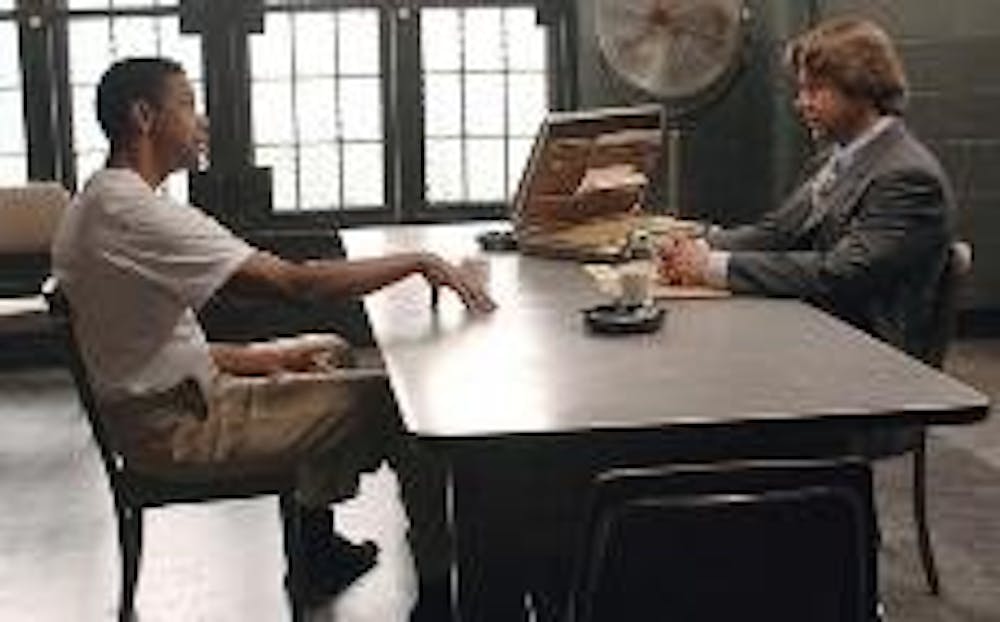American Gangster: A
Late 1960s and early 1970s, the United States was a time of civil strife, violence, drug use, public unrest, war, protest and societal change. It is during this turbulent period that "American Gangster" plows into audiences with Oscar-worthy performances and a mesmerizing plot.
Denzel Washington and Russell Crowe are at the pinnacle of their acting potential in "American Gangster," providing vivid and brutally honest portrayals of humans rather than characters and men rather than archetypes.
Washington is Frank Lucas, an all-American entrepreneur who rises to the very peak of power, the epitome of the American dream - during the time period, which lionizes the acquisition of vast sums of wealth and power by any means possible.
The film is unapologetic, leaving audiences to judge for themselves as Lucas beats, murders and bribes his way through the plot. Director Ridley Scott taps deep into the U.S. drug culture of the time, as Lucas brings to the streets of New York City 100 percent pure heroin by the brick.
In this world of crime and depravity, Washington completely and perfectly transforms into Lucas, a true "American Gangster." Without hesitation or mercy, Washington gives audiences a family man with anger issues, a complete human being with hobbies, habits and a fully developed personality that espouses integrity, honesty and hard work while putting bullets into the foreheads of his rivals.
Wherever there is order, there is chaos, and in "Gangster," where there is the orderly and brutal Lucas, there is also the haphazard and honest Richie Roberts played by Crowe. He brings to life a character that, while flawed and frayed, excels as the relentless underdog.
Admittedly, Roberts is very much a clichéd archetype. A serial-dating domestic disaster with an unhappy ex-wife and nonexistent social life, Roberts roars into that battle by the seat of his pants, making up his strategy with instinct rather than calculation, bending the rules as he sees fit. And yet, he is the consummately honest cop, looking vast sums of easy money right in the face and never blinking.
The character is really nothing new, but that is where Crowe comes in. His transformation into Roberts is absolute, as he becomes a deeply flawed individual with and for whom audiences nevertheless are able to empathize and ultimately root.
"American Gangster" is, more than anything, the story of the collision of these two men. The film begins in 1968 with the rise to power of Frank Lucas, who through willpower, ingenuity and U.S. criminal spirit, becomes a virtual kingpin of heroin, eventually controlling a vast empire ruled with an iron fist.
Lucas' story is told parallel to that of Roberts, with the plot cutting back and forth between the two men as they get closer and closer to a dramatic confrontation. As Lucas comes into his own, Roberts is banging down doors and waving around revolvers as he serves his own sense of justice.
"Gangster" is a cops-and-robbers story taken to a historical peak. Shoot-outs, mystery, intrigue, love, sex and some excellent social perspective make it a truly worthwhile film. The all-star cast of supporting actors vastly augments the power of all those elements.
Not a movie to be taken lightly, "American Gangster" graphically features adult themes in an adult setting, along with plenty of blood and violence. The view into that period of U.S. history, while virtually perfect, is only a view. The film, though a wonderful portrayal of 1970s United States, is still a movie made in 2007 United States.
Despite that flaw, "American Gangster" is an amazing roller-coaster of drama and action, complemented by brutally honest portrayals of the complex human animal and the even more complex historical U.S. animal.





